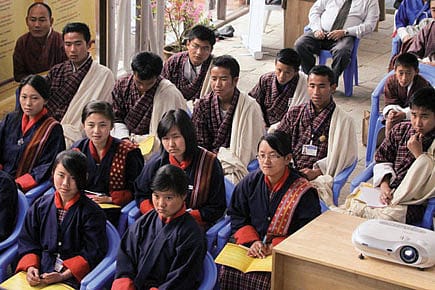Why Litfests Matter

They may be a dime a dozen these days. But writers can benefit immensely from these interactions
Last month, I attended the Mountain Echoes literary festival in Bhutan. We were a small group of writers, journalists, filmmakers and publishers who met bleary-eyed at Delhi International Airport to catch an elusive Druk Airways flight to Paro in the wee hours of the morning. Most of us knew each other, and a persistent refrain in conversations during the next four days was how it was so like attending a book launch in Delhi. Almost all the faces there were familiar.
Why then are literary festivals important if you get to meet the same set of people as in Delhi? They are important for what they offer new writers. And, as for established writers, it helps them get an insight into what excites readers and connect with them as well as with other writers. You may meet the same people at a Delhi book launch, but it is unlikely that you would talk to them there about the process of writing and publishing, or readership issues. At a literary festival, you spend some time, at least, discussing such issues. And it is from such debates that one gets to learn some really valuable lessons.
Some think that the idea of writers getting to connect at a literary festival is over-rated. But even if it doesn't work that way, one should still think of a lit fest as a 'catchment area' full of people committed to spending time for the sake of literature. So, while attending a Coetzee session, for example, they might also saunter into an event next door, of some less known writer. That way, they discover his work, and may share their experiences with others on Facebook or Twitter or in some other way, and help spread the word. And considering that publishers are not always able to promote new writers (unless they have received some astoundingly high advance), such unexpected promotion works wonders for books and writers.
Openomics 2026: Continuity and Conviction
06 Feb 2026 - Vol 04 | Issue 57
The performance state at its peak
I'm not a fan of sci-fi and fantasy writing, and before I went to Bhutan, I hadn't read anything by the young writer Samit Basu. But at the festival, I attended a session where he read from his recent work, Turbulence. I immediately got hooked. Back in Delhi, I ordered it on Flipkart and read it in one go. Other sessions were equally fruitful. Chandrahas Choudhury's session on what novels like Irene Nemirovsky's Suite Francaise could mean to us was equally engaging.
And then, there was the star film writer Jaideep Sahni who spoke to a small audience (it was the last session of that day and many had left) about his experiences with story-telling and how he came up with characters in hit films like Chak de India, Khosla ka Ghosla and Company. It went on long beyond the scheduled time and had to finally be stopped when the venue had to close. Sahni's insights into small-town India left the audience spellbound.
Even I got to informally talk about my work in Bastar and beyond with many, including publisher David Davidar. We spoke about Maoist insurgency and the changing world of publishing. He said that Delhi waits to be written about in the way Tom Wolfe caught the essence of New York in The Bonfire of the Vanities. On the last day of the festival, he spoke about what publishers expect of writers and how every book is a gamble and why self-publishing is not yet a good idea in India.
If nothing else, at least I made some new friends at the festival.
